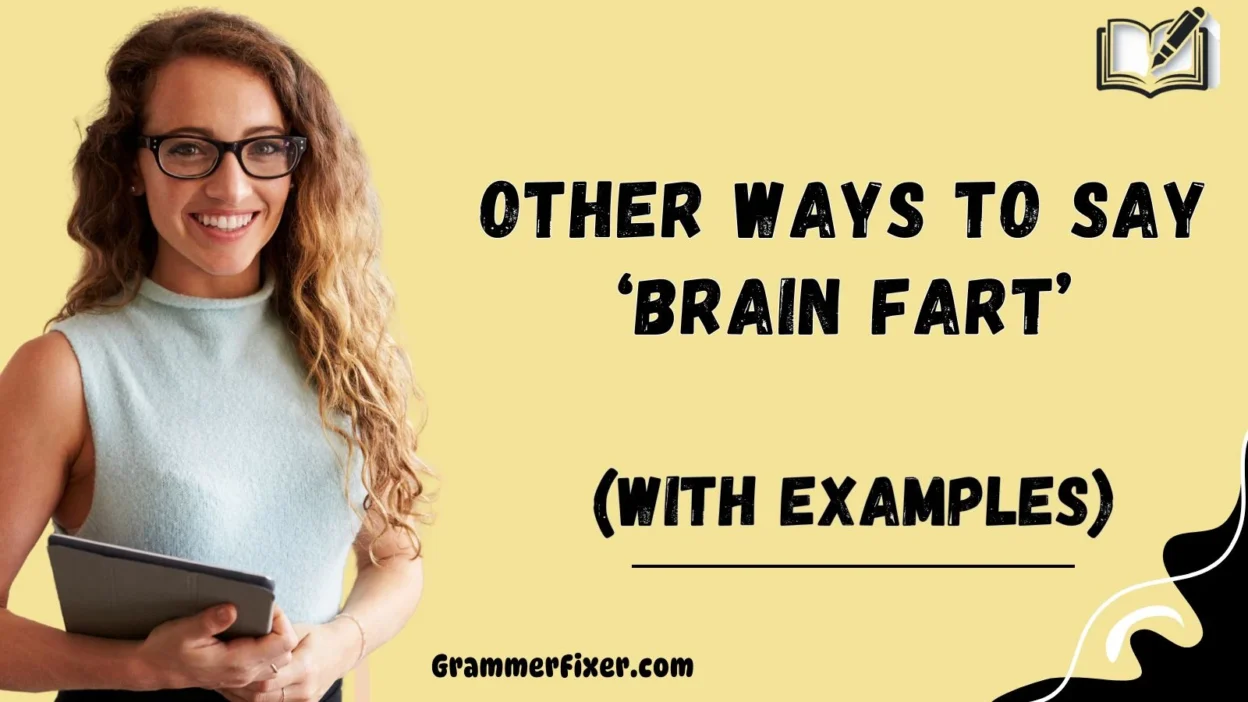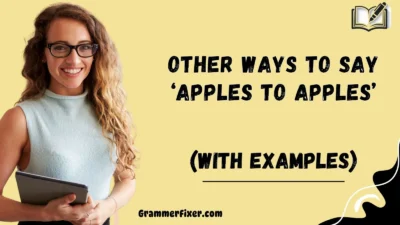We’ve all had those moments when our mind suddenly goes blank—maybe during a meeting, a presentation, or even in a casual conversation. While “brain fart” is a popular and humorous way to describe it, it can feel unprofessional or even childish in certain environments. Choosing the right words allows you to communicate with warmth, care, and professionalism, ensuring your message feels both respectful and relatable.
This article explores 30 professional synonyms for “brain fart”, offering alternatives that can help you connect more thoughtfully with colleagues, clients, and friends.
What Does “Brain Fart” Mean?
A “brain fart” is a colloquial phrase used to describe a momentary lapse in memory, attention, or thought. It’s when you suddenly forget what you were about to say, lose your train of thought, or make a silly oversight.
When to Use “Brain Fart”?
The phrase is best used in informal, lighthearted conversations with people you know well—like teammates, friends, or family. It helps add humor to an otherwise awkward situation. However, in professional environments, more polished alternatives may be better suited.
Is It Professional/Polite to Say “Brain Fart”?
In most professional settings, saying “brain fart” may come across as too casual or even unprofessional. It might work in laid-back company cultures or close-knit teams, but when addressing clients, managers, or formal meetings, choosing a neutral or respectful synonym is more appropriate.
Pros or Cons
Pros:
- Relatable and humorous
- Lightens awkward situations
- Universally understood in casual settings
Cons:
- Can seem juvenile or unprofessional
- Risks undermining credibility
- Not suitable for formal communication
1. Momentary Lapse
Meaning: A brief slip in memory or focus.
Detailed Explanation: Suggests the issue was temporary and not reflective of overall ability.
Scenario Example: “Apologies, I had a momentary lapse—I’ll circle back to the point.”
Best Use: Professional emails, meetings, reports.
Worst Use: Informal chats with friends—it may sound too stiff or overly formal.
Tone: Polite, formal, empathetic.
2. Mental Block
Meaning: A sudden inability to recall or process thoughts.
Detailed Explanation: Neutral phrasing commonly used in workplace settings.
Scenario Example: “I hit a mental block during my presentation, but I’ve gathered my thoughts now.”
Best Use: Presentations, professional discussions.
Worst Use: Casual conversations—it may sound overly clinical or dramatic.
Tone: Respectful, professional.
3. Memory Slip
Meaning: A minor forgetting of information.
Detailed Explanation: Acknowledges forgetfulness without self-deprecation.
Scenario Example: “Sorry for the memory slip—I’ll share the updated details right away.”
Best Use: Client communication, polite corrections.
Worst Use: Joking among close friends—it may sound too formal for a lighthearted setting.
Tone: Gentle, professional.
4. Lost My Train of Thought
Meaning: Losing track of what you were about to say.
Detailed Explanation: Common, relatable expression used across casual and professional settings.
Scenario Example: “I lost my train of thought—let me gather it again.”
Best Use: Meetings, everyday conversations.
Worst Use: High-stakes formal presentations—it may sound like a lack of preparation.
Tone: Neutral, empathetic.
5. Mind Blank
Meaning: A sudden pause when thoughts disappear completely.
Detailed Explanation: Simple and widely understood expression.
Scenario Example: “I had a mind blank during the discussion but remembered shortly after.”
Best Use: Professional and casual settings, universally accepted.
Worst Use: Formal written reports—it may sound too casual or vague.
Tone: Honest, approachable.
6. Drawing a Blank
Meaning: Being unable to recall something in the moment.
Detailed Explanation: A widely accepted phrase that feels conversational yet professional.
Scenario Example: “I’m drawing a blank on the exact figures, but I’ll double-check the report.”
Best Use: Meetings, team discussions, brainstorming sessions.
Worst Use: Highly formal writing—it may come across as too casual.
Tone: Relatable, conversational, professional.
7. Absent-Minded Moment
Meaning: A brief lapse due to distraction or forgetfulness.
Detailed Explanation: Frames the incident as natural and momentary, not careless.
Scenario Example: “I had an absent-minded moment and left the document on my desk.”
Best Use: Workplace conversations, emails with colleagues.
Worst Use: Client-facing formal reports—it may sound like you weren’t paying attention.
Tone: Soft, apologetic, human.
8. Forgetting Something
Meaning: Plain and straightforward description of memory loss.
Detailed Explanation: Direct but gentle acknowledgment of forgetfulness.
Scenario Example: “I’m sorry, I was forgetting something—we had already discussed that.”
Best Use: Simple conversations, casual or semi-professional settings.
Worst Use: Presentations or speeches—it may sound underprepared.
Tone: Honest, straightforward.
9. Temporary Oversight
Meaning: A small mistake or omission caused by forgetfulness.
Detailed Explanation: Highlights that the lapse is temporary and rectifiable.
Scenario Example: “Thank you for catching that—it was a temporary oversight on my part.”
Best Use: Professional emails, client communication, project reviews.
Worst Use: Casual jokes with friends—it sounds too formal and bureaucratic.
Tone: Professional, respectful, responsible.
10. Apologies, I Missed That
Meaning: A polite acknowledgment of missing or forgetting information.
Detailed Explanation: Shows humility and accountability while softening the error.
Scenario Example: “Apologies, I missed that point during the discussion—thank you for clarifying.”
Best Use: Client meetings, group discussions, professional apologies.
Worst Use: Informal texting with friends—it may sound overly formal and stiff.
Tone: Polite, apologetic, thoughtful.
11. Experiencing a Pause
Meaning: A momentary interruption in thought or speech.
Detailed Explanation: Neutral phrasing that avoids negative connotations.
Scenario Example: “I’m experiencing a pause, let me gather my thoughts.”
Best Use: Presentations, speeches, structured communication.
Worst Use: Casual settings with close friends—it may feel awkward or unnatural.
Tone: Neutral, composed, thoughtful.
12. Slipped My Mind
Meaning: Forgetting something unintentionally.
Detailed Explanation: A very common expression, universally understood, and polite.
Scenario Example: “It completely slipped my mind—I’ll send the file over right away.”
Best Use: Everyday conversations, workplace chats, friendly apologies.
Worst Use: Very formal documents—it may feel too casual for official writing.
Tone: Friendly, apologetic, casual-professional.
13. Word Escape
Meaning: When the right word temporarily eludes you.
Detailed Explanation: Conveys a subtle, polite way to acknowledge forgetting a term without embarrassment.
Scenario Example: “The word just escaped me—could you remind me?”
Best Use: Meetings, presentations, professional conversations.
Worst Use: Informal chats with friends—it may sound unnecessarily formal.
Tone: Polite, professional, thoughtful.
14. Brain Freeze
Meaning: A sudden halt in thinking or processing information.
Detailed Explanation: Slightly playful but can be professional if used carefully; conveys mental pause.
Scenario Example: “I experienced a brain freeze while reviewing the proposal.”
Best Use: Semi-formal team meetings, casual presentations.
Worst Use: Highly formal reports—it may appear too colloquial.
Tone: Light, approachable, semi-professional.
15. Cognitive Glitch
Meaning: A minor disruption in mental processing or recall.
Detailed Explanation: Tech-savvy, professional phrasing suitable for analytical or technical settings.
Scenario Example: “There was a cognitive glitch on my end; I’ll double-check the data.”
Best Use: Technical discussions, project updates, analytical settings.
Worst Use: Casual conversations with friends—it may sound overly clinical.
Tone: Neutral, analytical, professional.
16. Slip of the Mind
Meaning: A natural, minor memory lapse.
Detailed Explanation: Polite and common expression; softens the incident.
Scenario Example: “It was just a slip of the mind—I’ll correct it immediately.”
Best Use: Professional emails, client communication, team discussions.
Worst Use: Public speeches where high precision is expected—it may seem careless.
Tone: Polite, apologetic, approachable.
17. Temporary Mental Fog
Meaning: A brief period of unclear thinking or distraction.
Detailed Explanation: Suggests that the lapse is temporary and situational, not permanent.
Scenario Example: “I was in a temporary mental fog this morning but have now reviewed all the files.”
Best Use: Team check-ins, semi-formal conversations, professional emails.
Worst Use: High-stakes presentations—it may appear like a lack of focus.
Tone: Neutral, understanding, empathetic.
18. Momentary Brain Blip
Meaning: A short, minor lapse in thought or recall.
Detailed Explanation: Friendly yet professional phrasing, suitable for lighthearted acknowledgment.
Scenario Example: “Just a momentary brain blip—I’ve got the numbers now.”
Best Use: Team meetings, casual client updates.
Worst Use: Formal reports or documents—it may feel too informal.
Tone: Light, friendly, professional.
19. Thinking Stumble
Meaning: A brief interruption or error in thought flow.
Detailed Explanation: Gentle phrasing that conveys human error without blame.
Scenario Example: “I stumbled over my thoughts during the discussion—let me clarify.”
Best Use: Presentations, meetings, professional dialogue.
Worst Use: Highly formal communication—it may sound too casual or figurative.
Tone: Polite, empathetic, professional.
20. Temporary Mind Blank
Meaning: A fleeting inability to recall information.
Detailed Explanation: Clearly communicates a short-term lapse without judgment.
Scenario Example: “I had a temporary mind blank but now remember the client’s requirements.”
Best Use: Emails, meetings, casual professional discussions.
Worst Use: Written formal reports—it may be too conversational.
Tone: Neutral, apologetic, clear.
21. Fumble
Meaning: A minor mistake or misstep in thought or action.
Detailed Explanation: Suggests a temporary slip rather than a significant error.
Scenario Example: “I fumbled my words during the meeting, but here’s the correct information.”
Best Use: Casual professional discussions, team meetings.
Worst Use: Formal client reports—it may feel too informal or playful.
Tone: Light, approachable, semi-professional.
22. Blackout
Meaning: A brief loss of memory or mental processing.
Detailed Explanation: More dramatic phrasing, emphasizes the suddenness of the lapse.
Scenario Example: “I had a blackout during the discussion, but I’ve recalled the details now.”
Best Use: Team debriefs, informal presentations.
Worst Use: High-stakes formal settings—it may sound extreme or unprofessional.
Tone: Honest, dramatic, casual-professional.
23. Oops Moment
Meaning: A small, lighthearted slip or mistake.
Detailed Explanation: Friendly and relatable phrasing, often humorous.
Scenario Example: “Oops moment—I forgot to attach the file. Sending it now!”
Best Use: Internal team chats, casual emails.
Worst Use: Formal client communications—it may seem too playful.
Tone: Friendly, humorous, approachable.
24. Hiccup
Meaning: A minor interruption or glitch in thought or process.
Detailed Explanation: Suggests the issue is minor and easily correctable.
Scenario Example: “Just a hiccup in my notes—here’s the updated version.”
Best Use: Professional emails, casual presentations, team updates.
Worst Use: Very formal documentation—it may sound too informal.
Tone: Light, neutral, professional.
25. Temporary Freeze
Meaning: A brief pause in thinking or action.
Detailed Explanation: Highlights a short-term interruption rather than a significant error.
Scenario Example: “I hit a temporary freeze during the call, but I’m back on track.”
Best Use: Meetings, professional presentations, team discussions.
Worst Use: Official reports—it may seem too casual.
Tone: Neutral, professional, clear.
26. Snafu
Meaning: A minor confusion or error in a process.
Detailed Explanation: Slightly informal, borrowed from slang, conveys lighthearted disruption.
Scenario Example: “There was a small snafu in the report submission, now resolved.”
Best Use: Internal communications, casual team updates.
Worst Use: Formal client communication—it may appear unprofessional.
Tone: Informal, lighthearted, approachable.
27. Foggy Moment
Meaning: A brief period of unclear thinking or distraction.
Detailed Explanation: Suggests the mind is temporarily clouded but not incompetent.
Scenario Example: “I had a foggy moment earlier but have clarified everything now.”
Best Use: Team discussions, casual professional settings.
Worst Use: Public speeches or high-stakes presentations—it may appear unprepared.
Tone: Empathetic, conversational, professional.
28. Cerebral Glitch
Meaning: A minor disruption in mental processing or cognition.
Detailed Explanation: Tech-friendly, professional phrasing suitable for analytical environments.
Scenario Example: “Experiencing a cerebral glitch—I’ll revisit the analysis and update you.”
Best Use: Technical meetings, analytical discussions.
Worst Use: Casual conversation with friends—it may sound too formal or clinical.
Tone: Professional, neutral, precise.
29. Thought Stumble
Meaning: A brief interruption in the flow of thought.
Detailed Explanation: Gentle, descriptive phrasing that softens the lapse.
Scenario Example: “I stumbled over my thoughts, but here’s what I intended to say.”
Best Use: Presentations, team discussions, professional emails.
Worst Use: Written formal documentation—it may appear figurative rather than precise.
Tone: Polite, empathetic, professional.
30. Attention Drift
Meaning: Temporary diversion of focus or attention.
Detailed Explanation: Emphasizes that the lapse was due to distraction rather than incompetence.
Scenario Example: “My attention drifted for a moment—thank you for your patience.”
Best Use: Meetings, emails, professional conversations.
Worst Use: High-stakes reports—it may seem too casual or subjective.
Tone: Neutral, professional, thoughtful.
Conclusion
Choosing the right way to express a “brain fart” can make a big difference in how your communication is perceived. Each of these 30 professional synonyms allows you to acknowledge a momentary lapse with warmth, humility, and clarity, while maintaining politeness and professionalism.



